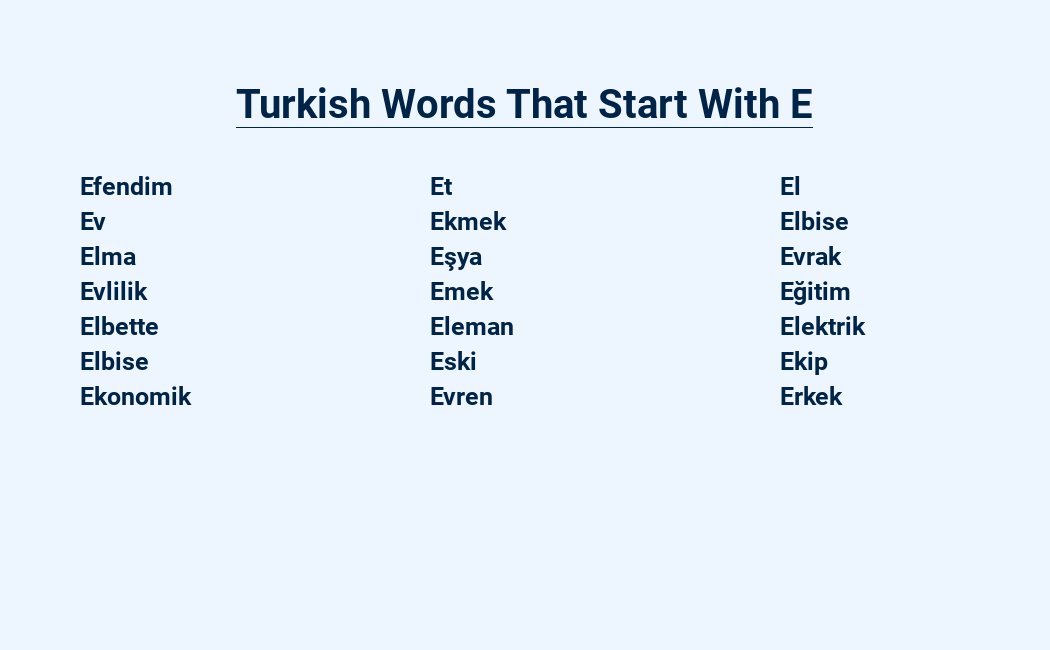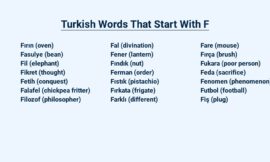Discover a comprehensive list of Turkish words that start with the letter “E”.
From everyday objects like “ev” (house) and “elma” (apple) to abstract concepts like “ekonomi” (economy) and “eğitim” (education), this guide provides a valuable resource for language learners and those interested in Turkish culture.
| Turkish Words | English Meaning |
|---|---|
| Ekmek | Bread |
| Eldiven | Glove |
| Eğitim | Education |
| Elektronik | Electronics |
| Ev | House |
| Emek | Labor |
Ebedi: Eternal, everlasting
Ebediyet: Eternity
Ebi: Uncle
Ebube: Magnificence, glory
Ecnebi: Foreigner, alien
Edat: Postposition
Edebi: Literary
Edep: Politeness, etiquette
Edilgen: Passive (grammar)
Edim: Do, make
Efendi: Gentleman, sir
Egemen: Sovereign, dominant
Egzoz: Exhaust
Eğitim: Education
Eğitimli: Educated
Eğlenmek: Have fun, enjoy oneself
Eğlence: Fun, entertainment
Eğri: Curved, crooked
Ehemmiyet: Importance
Ehl: People, family
Ehre: Reverence, respect
Eke: Suffix added to verbs to form the gerund
Ekmek: Bread
Ekonomi: Economy
Ekonomik: Economical
El: Hand
Elbise: Clothes, dress
Elek: Sieve
Eleman: Element
Elektrik: Electricity
Elektronik: Electronics
Elma: Apple
Elmas: Diamond
Eldiven: Glove
Emek: Labor, effort
Emekli: Retired
Emeklilik: Retirement
Emniyet: Safety, security
Emniyetli: Safe, secure
Emir: Order, command
Emirber: Officer
Emsal: Precedent, example
En: Most, highest
Encam: End, conclusion
Endam: Stature, figure
Enerji: Energy
Enerjik: Energetic
Engel: Obstacle, hindrance
Engellemek: Obstruct, hinder
Er: Man, male
Erkek: Male
Erkeklik: Masculinity
Erken: Early
Erlik: Evil, wickedness
Ermi ş: Saint
Erol: Name of a Turkish boy
Turkish Words That Start with E
Eşek
Eşek, meaning “donkey” in Turkish, often appears in proverbs and idioms. A commonly used phrase, “Eşek gibi çalışmak,” means “to work like a donkey,” emphasizing hard work and dedication.
Ev
Ev, meaning “house” in Turkish, holds significant cultural importance.
It represents a place of comfort, family, and stability.
Ev evokes a sense of belonging and togetherness, symbolizing the foundation of Turkish society and its deep-rooted values of hospitality and warmth.
El
El: Hand
El is a Turkish word that translates to “hand” in English.
It is commonly used in everyday conversations and is an essential part of the Turkish vocabulary.
Ekmek
Ekmek, meaning “bread,” is a staple food in Turkish cuisine. It is traditionally made from wheat flour, water, yeast, and salt, and baked in a variety of shapes and sizes.
Ekmek is often served with meals or as a snack, and can be used to make sandwiches, toast, and other dishes.
Elma
Elma, meaning “apple” in Turkish, is a widely consumed and versatile fruit.
It is commonly eaten fresh, used in desserts, and processed into various products like juice, cider, and vinegar.
Elma also holds cultural significance, featuring in Turkish cuisine, mythology, and literature.
Eski
Eski, meaning “old” or “ancient” in Turkish, holds historical significance. It’s commonly used to describe something that has existed for a long time or possesses historical value.
The term finds application in various contexts, from describing historical artifacts to expressing the idea of tradition.
Eklemek
“Eklemek” is a Turkish verb that means “to add” or “to include.” It is often used in the context of adding an item to a list or collection, or incorporating something into a whole.
Eğitim
“Eğitim” in Turkish means “education.” It encompasses the process of acquiring knowledge, skills, values, beliefs, and habits.
Eğitim involves teaching, training, and learning in various settings, including schools, universities, workplaces, and communities.
It plays a crucial role in personal development, societal progress, and economic prosperity.
Ekonomi
Ekonomi (economy) encompasses the production, distribution, and consumption of goods and services. It also involves the management of resources, including money, labor, and capital.
Understanding economic principles helps individuals and businesses make informed decisions about resource allocation and financial planning.
Elektronik
Elektronik is the Turkish word for “electronics.” It encompasses various devices, systems, and components that utilize electric current or electromagnetic fields to process, transmit, and store information. Elektronik plays a vital role in modern society, driving advancements in communication, computing, automation, and many other technological domains.
Final Verdict
The Turkish language is replete with words that commence with the letter “E,” reflecting the diverse cultural, historical, and linguistic aspects of Turkish society. From common objects like “elma” (apple) to abstract concepts such as “ekonomi” (economy), these words encapsulate the essence of Turkish identity and provide a glimpse into the rich tapestry of its linguistic heritage.
Exploring these words unveils the intricate connections between language and culture, highlighting the dynamic and multifaceted nature of Turkish vocabulary.


